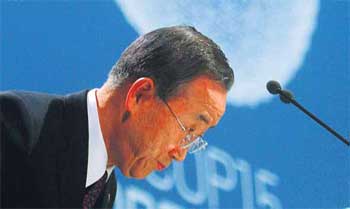Beginning of the end?
Professor Tan Sri Dato' Dzulkifli Abd Razak
Learning Curve : Perspective
New Sunday Times - 12/27/2009
UNITED Nations Secretary-General Ban Ki-Moon referred to the Copenhagen Accord as a fresh start at the end of the recent United Nations Climate Change Conference 2009.
“Finally we sealed a deal. The Copenhagen Accord may not be everything everyone had hoped for, but this ... is an important beginning ,” said Ban.

The question on everyone’s minds is: A dawn to what? Could it be the start of the end? This is perhaps the most likely answer, by all accounts.
The accord is reportedly “weaker than a legally binding treaty and even that of ‘political’ deals”.
The plenary session at the Danish capital, after several stormy sessions, merely “took note” of the new accord replacing the Kyoto Protocol.
The protocol to prevent climate change and global warming will run out in 2012 and there is an urgent need for a new one.
Unfortunately, what turned out in Copenhagen was not even near anything that everyone had hoped for, at least not those from the developing countries.
The line that divides the Global North and Global South is becoming clearer than ever. So too that of the richer and poorer countr ies! Many Third World n at i o n s joined the global chorus of condemnation saying that Copenhagen’s failure was unacceptable because of the high price that they have to pay in the near future.
No serious thought was given to the billions of dollars pledged to help developing countries cope with the effects of climate change. This was compounded by a lack of details on the sources of money.
Moreover, the sum “approaching” US$30 billion (RM105 billion) spread over the next three years appeared to be minuscule, even if it is fully paid out, bearing in mind the current recession.
And the annual US$100 billion “commitment” by 2020 seemed more like a mirage since the funding required by developing countries alone would be in the trillions yearly.
Learning Curve : Perspective
New Sunday Times - 12/27/2009
UNITED Nations Secretary-General Ban Ki-Moon referred to the Copenhagen Accord as a fresh start at the end of the recent United Nations Climate Change Conference 2009.
“Finally we sealed a deal. The Copenhagen Accord may not be everything everyone had hoped for, but this ... is an important beginning ,” said Ban.

Ban Ki-moon bows his head towards the audience after his address during the official opening ceremony of the United Nations Climate Change Conference 2009 in Copenhagen.
The question on everyone’s minds is: A dawn to what? Could it be the start of the end? This is perhaps the most likely answer, by all accounts.
The accord is reportedly “weaker than a legally binding treaty and even that of ‘political’ deals”.
The plenary session at the Danish capital, after several stormy sessions, merely “took note” of the new accord replacing the Kyoto Protocol.
The protocol to prevent climate change and global warming will run out in 2012 and there is an urgent need for a new one.
Unfortunately, what turned out in Copenhagen was not even near anything that everyone had hoped for, at least not those from the developing countries.
The line that divides the Global North and Global South is becoming clearer than ever. So too that of the richer and poorer countr ies! Many Third World n at i o n s joined the global chorus of condemnation saying that Copenhagen’s failure was unacceptable because of the high price that they have to pay in the near future.
No serious thought was given to the billions of dollars pledged to help developing countries cope with the effects of climate change. This was compounded by a lack of details on the sources of money.
Moreover, the sum “approaching” US$30 billion (RM105 billion) spread over the next three years appeared to be minuscule, even if it is fully paid out, bearing in mind the current recession.
And the annual US$100 billion “commitment” by 2020 seemed more like a mirage since the funding required by developing countries alone would be in the trillions yearly.

A chimney billows smoke behind electricity wires in central Beijing. December 21, 2009. British Environment Minister Ed Miliband has accused China, Sudan, Bolivia and other left-wing Latin American nations of having tried to hijack the U.N. climate summit to stop a deal, London's Guardian newspaper reported on Monday. The summit in Copenhagen ended with a bare-minimum agreement on Saturday when delegates “noted” an accord struck by the United States, China and other emerging powers fell far short of original goals.
Countries such as South Africa, for example, were more specific in their criticism of how the host country had (mis)guided the conference.
There was allegedly an atmosphere of distrust and suspicion that “Denmark was plotting to force its own position on other nations”.
Lumumba Stanislaus Di-Aping from Sudan was quoted as saying: “Your Prime Minister has chosen to protect the rich countries,” referring to Denmark’s Lars Løkke Rasmussen.
It is not difficult to understand the en masse walkout by the G77, a group which represents 130 developing countries (out of the 193), due to its concern about the negotiation that eventually s aw the existing Kyoto Protocol being abandoned.
The protocol is more specific in its target to reduce or limit greenhouse gas emissions, especially among the richer (by inference more polluting) nations.
But the discussion in Copenhagen failed to obligate any countries to meet a specific emission-reducing target. Instead, what seemed like empty pledges abound!
Malaysia can stand tall when Prime Minister Datuk Seri Najib Tun Razak said in his speech at the conference: “I would like to announce here in Copenhagen that Malaysia is adopting an indicator of a voluntary reduction of up to 40 per cent in terms of emissions intensity of GDP (gross domestic product) by the year 2020 compared to 2005 levels.” Although the cut is conditional on receiving the transfer of technology and adequate financing from the developed world, Malaysia’s intention is clear.
This is backed by Najib’s reminder of Malaysia’s commitment at the Rio Summit to ensure that at least half of its land area remained as forests.
Currently our natural forests and agriculture crop plantations cover 75 per cent of the country’s land area.
We must take serious steps to live up to the commitment. This would make a brilliant resolution for the new year.
* The writer is the Vice-Chancellor of Universiti Sains Malaysia. He can be contacted at vc@usm.my
